Trihexyphenidyl
Uses
Trihexyphenidyl is used to treat Parkinson's disease and drug-induced abnormal movements.
How it Works
How Trihexyphenidyl works Trihexyphenidyl is an anticholinergic medication that decreases the activity of the chemical messenger acetylcholine in the brain. This action improves muscle control and reduces stiffness in Parkinson's disease. Additionally, it alleviates movement disorders, such as restlessness, involuntary movements, or muscle spasms, caused by certain other medications.
Expert Advice
- Dry mouth may occur as a side effect.
- Frequent mouth rinses, good oral hygiene, increased water intake, and sugarless candy may help alleviate symptoms.
- It may cause dry eyes.
- Avoid wearing contact lenses and inform your doctor if dry eyes become bothersome.
- It may cause dizziness and sleepiness.
- Do not drive or engage in activities requiring concentration until you know how it affects you.
- Monitoring of intraocular pressure is required while taking this medicine, as an increase in eye pressure may lead to blurry vision.
- Inform your doctor if you have glaucoma or experience difficulty passing urine.
Other Combinations
Haloperidol + Trihexyphenidyl
Chlorpromazine + Trifluoperazine + Trihexyphenidyl
Chlorpromazine + Trihexyphenidyl
Risperidone + Trihexyphenidyl
Thioridazine + Trifluoperazine + Trihexyphenidyl
Chlordiazepoxide + Imipramine + Trifluoperazine + Trihexyphenidyl
Chlordiazepoxide + Trifluoperazine + Trihexyphenidyl
Trifluoperazine + Trihexyphenidyl
Related Medications
Trihexyphenidyl 2mg

₹14

₹7.8
MRP ₹14.3
Trihexyphenidyl 2mg

₹15

₹7.8
MRP ₹14.3
Trihexyphenidyl 2mg
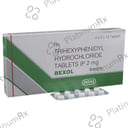
₹14.6

₹7.8
MRP ₹14.3
Trihexyphenidyl 2mg

₹14.6

₹7.8
MRP ₹14.3
Trihexyphenidyl 2mg

₹13.8

₹7.8
MRP ₹14.3
Trihexyphenidyl 2mg

₹12.1

₹7.8
MRP ₹14.3
Trihexyphenidyl 2mg

₹15.6

₹7.8
MRP ₹14.3
Trihexyphenidyl 2mg

₹2.9

₹7.8
MRP ₹14.3
Trihexyphenidyl 2mg

₹8

₹7.8
MRP ₹14.3
Trihexyphenidyl 2mg

₹14

₹7.8
MRP ₹14.3
Trihexyphenidyl 2mg

₹11.8

₹7.8
MRP ₹14.3
Trihexyphenidyl 2mg
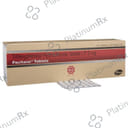
₹43.5

₹7.8
MRP ₹14.3
Trihexyphenidyl 2mg

₹11.9

₹7.8
MRP ₹14.3
Trihexyphenidyl 2mg

₹10.7

₹7.8
MRP ₹14.3
Trihexyphenidyl 2mg

₹9.5

₹7.8
MRP ₹14.3
Trihexyphenidyl 2mg

₹15.2

₹7.8
MRP ₹14.3
Trihexyphenidyl 2mg
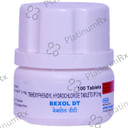
₹121.1
MRP ₹146
Trihexyphenidyl 2mg

₹33.6

₹7.8
MRP ₹14.3
Trihexyphenidyl 2mg

₹24

₹7.8
MRP ₹14.3
Trihexyphenidyl 2mg
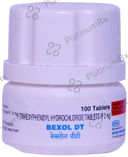
₹73

₹121.1
MRP ₹146
Trihexyphenidyl 5mg

₹26.9
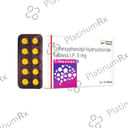
₹14.1
MRP ₹28.1
Trihexyphenidyl 5mg

₹25

₹14.1
MRP ₹28.1
Trihexyphenidyl 5mg

₹31

₹14.1
MRP ₹28.1
Trihexyphenidyl

₹13.4
Trihexyphenidyl

MRP ₹15
Flat ₹100 off on first app order | Use Code: APP100 |
Flat ₹100 off on first app order
USE CODE: APP100

Download Now